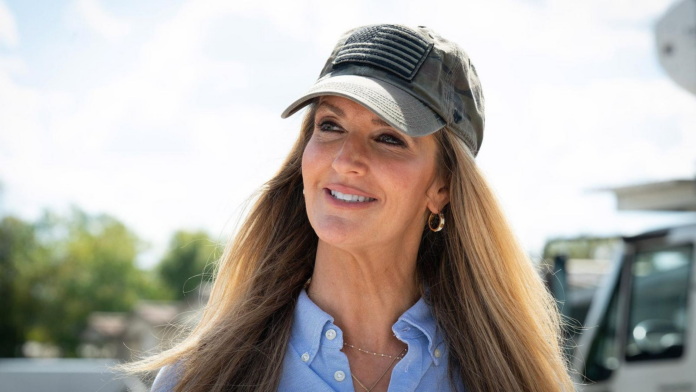Kelly Loeffler describes herself as an entrepreneur whose work ethic propelled her from a simple family farm to the upper echelons of finance and politics. The truth is more complicated.
By Dan Alexander , Forbes Staff
T wo days before the 2024 election, former U.S. Senator Kelly Loeffler strode to the stage at a Trump rally in Macon, Georgia, wearing a bright pink jacket that perfectly matched the pink MAGA hats in the stands behind her. “Hello patriots!” she yelled, with her hand in the air. “Is Georgia Trump country?!” Speaking to the crowd, she took direct aim at billionaire Mark Cuban, who had recently said Trump does not associate with strong, intelligent women. “I stood up to Mark Cuban,” Loeffler boomed into the microphone, “And I said, ‘You know what, Mark, I’m an entrepreneur. I’m a former CEO. I owned a basketball team. You know, I’ll take you on.”
Loeffler likes to paint herself as a self-made business titan. There’s no question she has had a successful career, mostly at Intercontinental Exchange, the parent company to the New York Stock Exchange, where she led investor relations, marketing and communications, accumulating enough equity to sell more than $30 million of shares and still retain a $12 million stake. But the real money in her household—a nearly 20,000-square-foot spread in Atlanta—comes from Loeffler’s husband, Jeff Sprecher, the founder of Intercontinental Exchange, who is worth an estimated $1 billion.
Loeffler, who married Sprecher in 2004, two years after joining his company, chafes at the suggestion that she owes her financial success to her husband. Lately, she has jumped at opportunities to prove herself. In 2018, she became CEO of crypto startup Bakkt and promptly rang up massive losses. With the business flailing, she shifted to politics, writing a big check to Georgia’s governor, who then appointed her to the U.S. Senate after Johnny Isakson stepped down amid health concerns (he had been battling Parkinson’s). On Capitol Hill, Loeffler sowed doubts about the 2020 election and spoke out against Black Lives Matter, leading players on her WNBA team to campaign for her opponent. She then lost her only election, handing her seat to Baptist pastor Raphael Warnock and helping flip control of the U.S. Senate to Democrats.
But with enough cash and connections, there’s no end to second chances. Loeffler’s latest: an appointment to Donald Trump’s cabinet, where she will helm the Small Business Administration, despite her own small-business struggles. “Can’t keep a good woman down,” says former Secretary of the Navy Richard Spencer, who worked with Loeffler before and after she joined Intercontinental Exchange and is one of several former colleagues who remain impressed with her. “Why would I want her in charge of the SBA? In fact, the fact that she does have some things that didn’t go perfectly well, you know. Don’t give me the person who has always succeeded. I want the person who is a success but has failed along the way, because they know what scars are like.”
Loeffler (fifth from the left) joined Donald Trump last month at the New York Stock Exchange, which she helped her husband’s company acquire in 2013. Spencer Platt/Getty Images
A
communications professional, Loeffler has a knack for self-promotion, portraying herself more like an ultrawealthy mogul than a mere executive, complete with a rags-to-riches tale. She often talks about how she grew up on a family farm in Illinois, emphasizing humble roots while glossing over the significant scale of the operation, which reportedly included 1,800 acres and a trucking business. She stayed near home to attend the University of Illinois, studying business and becoming the first in her family to graduate from college. “An opportunity,” she said on the podcast of Tennessee Senator Marsha Blackburn, “for me to get off the farm.” While Forbes reached her staff and several ex-colleagues, Loeffler did not agree to be interviewed.
Diploma in hand, she moved to California to join the management trainee program at Toyota, where she worked in distribution and finance, eventually as a district account manager. She decided to go to business school at DePaul in Chicago and reportedly borrowed against farmland she received from her grandmother to help pay for it. Upon graduation in 1999, she dove more deeply into finance, briefly working as an equity analyst at Citigroup, then William Blair, before shifting to investor relations at a private equity shop in Dallas. “She proved her salt to me in just the work that she did, the energy that she had and the let’s-get-it-done attitude,” says Spencer, the former president of the private equity firm.
After Spencer moved to Intercontinental Exchange, he brought Loeffler on board in 2002. Referring to those days now, Loeffler minimizes the strength of the business, referring to it as a “startup” that she says she helped grow from “less than 100 employees.” In fact, the company turned a net profit of $35 million on $125 million of revenue in 2002, the year she joined, employing 201 people. Loeffler says she got hired to help take the company public, but as Spencer recalls it, she entered “a good time before that,” noting that Intercontinental Exchange had a handful of major investors back then, including Shell, Deutsche Bank, Morgan Stanley, Goldman Sachs and BP. “They were needy investors,” he says. “They liked to be talked to a lot. She did a good job.”
Eventually, Intercontinental did make the move to go public, which Spencer says led to a closed-door meeting between him and CEO Jeff Sprecher as they were preparing the prospectus, also known as an S-1. “Jeff walked in one Monday morning,” Spencer laughs. “And he says, ‘I’ve got something to tell you. And I went, ‘Oh, no.’ And he said, ‘Yeah, I’m going to marry Kelly.’ And I said, ‘Wow, we might have to redo the S-1.’”
Power couple: Loeffler joined Intercontinental Exchange in 2002, married CEO Jeff Sprecher in 2004 and worked with him to take the company public on the New York Stock Exchange in 2005. Richard Drew/AP
Chuck Vice, the former vice chairman of Intercontinental, witnessed the dynamic between Loeffler and Sprecher up close, working out of the office between them. “They didn’t really have hobbies,” Vice says. “They both enjoy working. They both enjoy business. And so we always felt like, when they leave the office and they go home, they’re still talking about business. And we’re getting, as a company, we’re getting so much value from the both of them.”
Sprecher owned 4.5% of the firm by the time he took it public in 2005, a stake worth about $60 million, while Loeffler held less than $1 million worth of options, according to an analysis of securities filings. Over the years, they both sold often, converting equity into cash. Meanwhile, the business continued to grow, largely through acquisitions, most notably when Intercontinental purchased the New York Stock Exchange for $11.1 billion in 2013. By the end of that year, Sprecher had sold more than $175 million of stock while hanging onto a roughly $300 million stake.
“She obviously benefitted, and he benefitted, too,” says former New Hampshire Senator and Governor Gregg Judd, a Republican who served on the board of Intercontinental Exchange and describes Sprecher as a visionary who was fortunate to have Loeffler at the company to keep him in check. “She was very much a force to settle things out and make sure that he didn’t run too far too fast.”
Loeffler and Sprecher paid $10.5 million in 2009 for an Atlanta home said to include a 70-million-year-old dinosaur footprint in the kitchen floor. Loeffler also purchased a stake in the WNBA’s Atlanta Dream alongside Mary Brock, the wife of the former CEO of bottler Coca-Cola Enterprises. Loeffler dabbled in politics, too, getting involved at the state level around 2010, then spending more than $1 million with Sprecher to support Mitt Romney’s presidential bid in 2012. Loeffler mulled a run of her own for U.S. Senate in 2014 but decided against it, opting instead to stick with Intercontinental.
Loeffler, who co-owned the Atlanta Dream from 2011 to 2021, talked during a 2019 game with team president Chris Sienko, who describes his former boss as




